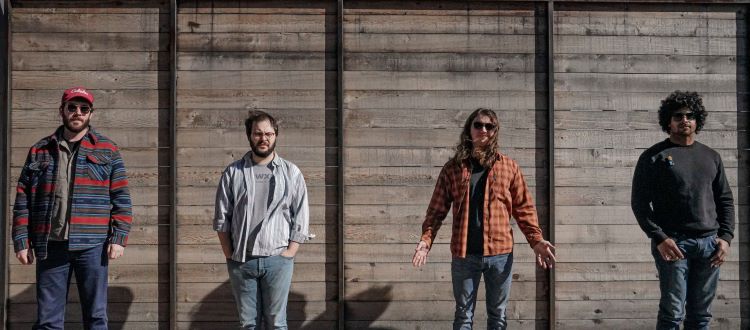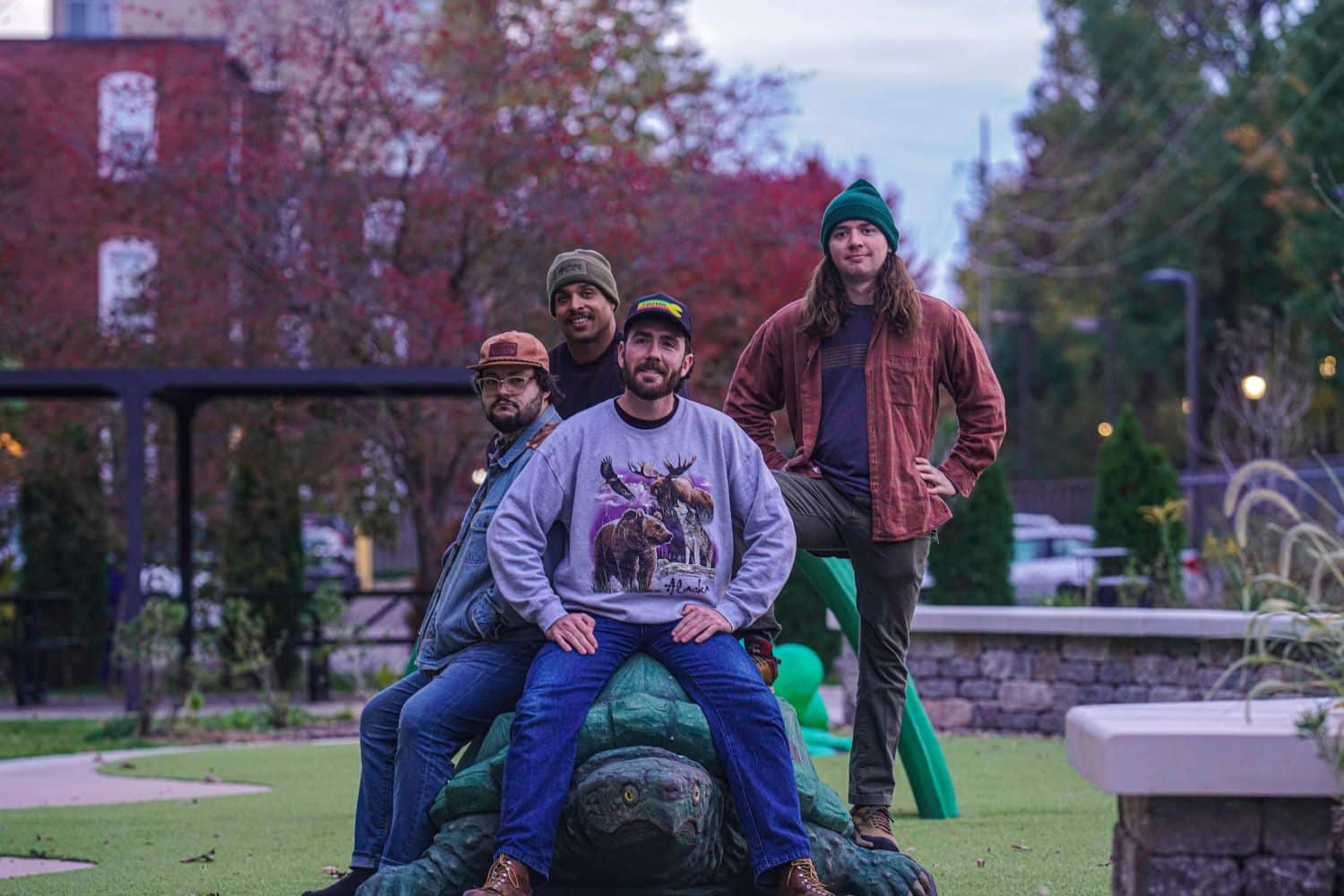Last updated on April 7th, 2024 at 08:36 am
As a proud Upper Midwestern music website, there’s nothing we enjoy more than shedding light on great music happening in our region. We love a good homegrown success story, whether about sold-out shows, innovative new records, or making impacts beyond music.
I particularly like stories of hard-earned breakthroughs by deserving local acts. There’s not much cooler than seeing an act you love earn bigger stages and warm receptions after years of performances.
Exemplifying this for me at the moment is Armchair Boogie, a young, progressive bluegrass band originally formed in Wisconsin. The quartet has been gigging locally, regionally, and nationally for nearly a decade, growing their fanbase in the Upper Midwest and beyond through highly energetic and funky live shows. Earlier this month, they released their fourth record, Hard Times and Deadlines, an album that builds on that energy while showing considerable growth in the songwriting department.
Like many bands in the Midwestern roots scene, Armchair Boogie defies easy musical classification. While they are clearly indebted to various schools of bluegrass, the band’s funky sound, buoyed by drums and electric bass, is miles away from the older school “traditional” wing of the genre. Their eclectic, jammy sound evokes Colorado jam-grass like Leftover Salmon or Yonder Mountain String Band more than Bill Monroe or Ralph Stanley. Even when compared to their peers and influences, Armchair Boogie creates a unique, quirky vibe through easygoing personalities, serious songwriting, and solid instrumental chops.
The band returns to the Twin Cities on Saturday, March 23, at the Turf Club, and fans who caught their November Fine Line gig opening for the Kitchen Dwellers can attest that the band is playing at a very high level. The cozy Turf is a terrific venue to catch them, and the energy should be off the charts. With AJ Lee & Blue Summit opening, the late-night celebration and headlining show may be a sign of big things to come for Armchair Boogie.

Below is an interview with Armchair Boogie guitarist Ben Majeska. The following has been edited for length and consistency.
Music in Minnesota: Hard Times and Deadlines reflects a variety of influences and backgrounds, from bluegrass to funk to jammier stuff and rock. I’m curious about your bluegrass background in particular; was that always something you were drawn to as a fan and player, or did that come later?
Ben Majeska: It definitely came later. I started playing guitar when I was like seven and in elementary school. Sometime in late middle school or early high school, I had a teacher who knew I played guitar, and they started giving me grocery bags full of Grateful Dead CDs and Yonder Mountain String Band CDs.
They started feeding me some different inspirations, like “Hey, check this out,” and they ended up taking me to my first Yonder Mountain String Band show during my freshman year of high school. So Yonder was my first introduction to it. And then I started in the modern bluegrass world, being intrigued by that and tracing it back to the roots and everything. I was kind of purely a listener for a while and attending concerts, enjoying that. I was more of an electric guitar player at the time and thought it looked pretty hard to solo on an acoustic guitar, so I counted it out but kept shredding on the electric.
And sure enough, when I met Augie (Dougherty) in college and found out he played the banjo, I was like, “Hey, maybe I’ll start strumming along to some of this stuff.” Next thing you know, you find some melodies, make some friends who also like bluegrass, and start playing together. That’s when it got real fun. Anyway, it was probably about seven to ten years into playing that I really started getting into bluegrass. I was a slightly late bloomer, but I found my way to it, and now it feels like home.
MIM: I think a lot of bluegrass fans in our generation share a similar story to yours: You start with Yonder or the Grateful Dead, then discover some of the newer or jammier stuff, and then go back and get Bill Monroe, Del McCoury, and Ralph Stanley. So that story certainly resonates.
BM: Yeah, for sure, unless you’re growing up in a bluegrass family or something. You’ve got to find your way to it somehow. I agree.
MIM: So you guys never existed in any iteration as a “traditional” bluegrass band? You guys were always “funky”?
BM: The very early days, in late 2014, were so sparse. We don’t really say Armchair Boogie started in 2014, but it is a fact that Augie and I were a duo first, doing like ten shows before we found a bassist and a drummer to play with and really found our sound. Before that, it was a little bluegrassy, probably more folky, but never just traditional bluegrass at all. We always had our own little spin on things.
MIM: That’s what keeps it fresh for you guys, you have your own sound. I’m also curious about the funk side of it. I saw you guys with the Kitchen Dwellers recently, and that stuck with me. I know you’ve been in funk bands at different points; does that still feel like an influence?
BM: Oh yeah, big time. I kind of bring the funky originals to the table. We’ve all got the funk in us, but it’s easier for me to write a funk tune than it is a bluegrass tune, and that’s just part of who I am. How I got there is just years of listening to music and a lot of electric guitar playing. Around the time Armchair was forming, I had a band in college called The Rumble Roots that I thought was going to be what Armchair was. And then things naturally progressed to doing some funky stuff in Armchair. I guess it kind of follows me wherever I go.
That being said, Augie writes some almost honky-tonk feeling songs that have funk elements to them as well. And then, I have a new band called Wonderfunk that scratches that itch for me. I always have to have some project going on my electric guitar.
But it’s so much fun in Armchair, getting the funky banjo going, and then the acoustic guitar, and just hearing a big soul sound with this really weird and unique lineup. It seems to work, and we really find the pocket a lot. It’s always been a part of Armchair Boogie. It’s never been spoken like “Hey I’ll write the funky tunes,” we all just bring what we bring to the table and it meshes well together.
MIM: The new album has horns, and you play a little electric on it as well. It’s cool to hear the grooves as you combine all of those worlds in your sound.
BM: That’s an especially fun part about this album in particular, and any album you make. There’s a lot more options in the studio than live. We like to exercise that right to an extent; we’re staying true to the sound but obviously adding some different texture and color with other instruments. That created an even bigger sound that we like to think we can still capture live. The horns were a really fun addition, which I’ve wanted to do for a while, it just feels like such a unique thing. Maybe it’s out there, but I’d love to hear if there’s another song recorded with a three-piece horn section in addition to a banjo, guitar, drums, and bass. The album gave us some really fun liberties that we like to work with. I’m happy with the result for sure.
MIM: I know the album was, in part, written in the early stages of the pandemic. Was your process different than on your previous recordings?
BM: The difference is mostly comfort in the studio. I think a lot of times, the more albums you put out and the more time you spend in the studio, the less intimidating it is. There’s always some intimidation factor of putting something in stone. It felt a bit more natural this time around in the studio. We were able to do a bit of live tracking that we were very happy with rather than cutting everything together. The songwriting all happened organically.
It did take time, though. This album was recorded over a year and that was also a little different. On previous albums we had sessions more closely together. It was also really cool recording this album because we’ve had some of our best shows in recent years, been on awesome tours, and graced some really cool unexpected stages. We’ve played with some amazing bands and even Grammy award winners like the Infamous Stringdusters. So when you’re recording between these new, wild, and cool tours, it gives you a different kind of inspiration and keeps you extra excited about what you’re doing. We had a lot of life experience throughout the making of this album and I really think that was beneficial.
MIM: You guys are from Wisconsin and I know you guys are touring nationally, but I do want to ask about that regional aspect. It seems like there’s a thriving roots and bluegrass scene in the Upper Midwest. How do you guys see yourselves fitting into that, and how did those scenes shape you?
BM: That’s a great question that I really do love to answer, because I am a big fan of Wisconsin, the Midwest, and the music scene that it holds. A big reason we’re doing what we’re doing is Horseshoes and Hand Grenades. When we met, they were thriving up in Stevens Point as they always have. At the time, they were on their way out of college and still hanging out in Stevens Point and throwing awesome shows. So we had them to look up to, not only as eventual friends, but we were also wildly impressed with this band drawing huge crowds with such good music, and they were so down to earth, touring the country and making it all work. It showed us at a very pivotal part of our lives that you can be a musician and it looked fun (laughs).
We already had the love for music and one by one we met each other, but that was definitely a seed planted by them that had an influence. I’d like to think we would’ve found each other either way, but they just stoked the fire of this amazing music scene in central Wisconsin that really inspired us and gave us fuel. Then they gave us the opportunities to open up for them in those big crowds.
Other bands like Dead Horses also let us play shows before they heard our music, because there’s a lot of support: it doesn’t feel like a “competitive” scene. All the bands in the scene, whether it’s Point or Madison or around Wisconsin or Minneapolis, it feels like everybody is rooting for each other. People are sharing their stuff, and people are happy to see each other on the road, and there’s so much talent and variety and unique sounds.
After traveling to all these different states and playing all these festivals and everything, I’m enamored by that, and draw so much inspiration from it all. But every time I come back to Wisconsin, I look around and just feel like the Midwest has such a thriving music scene. It might not be talked about as much as Nashville or San Francisco, and that’s alright too, but I also know touring musicians love playing the Midwest as well.







Comments
0 comments